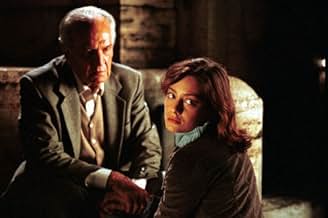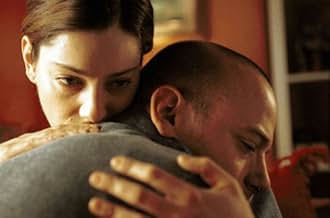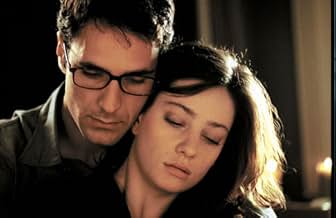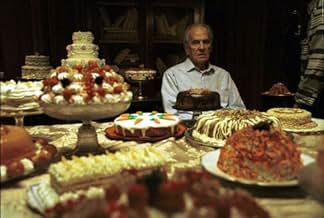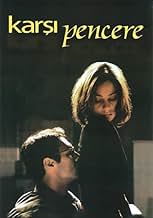
Überlastet und in einer faden Ehe gefangen, beginnt Giovanna, sich um den jüdischen Holocaust-Überlebenden zu kümmern, den ihr Mann mit nach Hause genommen hat. Sie fängt an, über ihr Leben ... Alles lesenÜberlastet und in einer faden Ehe gefangen, beginnt Giovanna, sich um den jüdischen Holocaust-Überlebenden zu kümmern, den ihr Mann mit nach Hause genommen hat. Sie fängt an, über ihr Leben nachzudenken, und fühlt sich immer mehr zu dem Mann hingezogen, der ihr gegenüber wohnt ..... Alles lesenÜberlastet und in einer faden Ehe gefangen, beginnt Giovanna, sich um den jüdischen Holocaust-Überlebenden zu kümmern, den ihr Mann mit nach Hause genommen hat. Sie fängt an, über ihr Leben nachzudenken, und fühlt sich immer mehr zu dem Mann hingezogen, der ihr gegenüber wohnt ...
- Regie
- Drehbuch
- Hauptbesetzung
- Auszeichnungen
- 34 Gewinne & 24 Nominierungen insgesamt
- Tintora
- (as Veronica Bruni)
- Alessio
- (as Ohame Brancy Chibuzo)
Empfohlene Bewertungen
Beginning with the suffocatingly ordinary life of a young couple in Rome and developing as the couple host a stranger, an old man in their house and the lead actress' "improper" attraction to a stranger about whom she knows nothing; the story unfolds into the impossibility of two parallel love stories. The story of two young men during the Nazi suppression; and that of a man and a married woman; two relations both of which are considered highly immoral in their respective environments.
Through the flashbacks, we are taken back to how love finds a way in a country under occupation and we see how the young woman sees her own love's fate in the old man's sad story.
Worth seeing, and seeing again.
Giovanna Mezzogiorno (also in "Don't Tell" aka Beast of the Heart) plays Giovanna the central 'heroine' - a young woman with plenty of mixed emotions, who is discontented with her (chicken factory accountant) job, mother to two children, wife to a husband who's night shift job schedule frustrates her, and most of time she shouts at him and wouldn't want to listen - yes, she's quite bitchy about herself, though finds brief solace when doing bit of occasional baking. Through the course of meeting the unexpected stranger that Massimo Girotti portrayed - Simone/Davide the old man at a lost, who seems to have amnesiac problem and was temporarily taken in by Giovanna's husband into their home against her wishes, yet her whole world starts to change. Writer-director Ferzan Ozpetek has a way of telling his stories, always full of humanity, foibles and virtues mixed together, turning out a thoughtful film never short of gentleness and the sharing of human kindness.
There are side events, of course: the young man whom she now and then noticed across her kitchen window in the next building, the flashbacks and 'Déjà Vu' storyline that the old man Simone experiences, the delightful turn of events - those attractive delicious-looking display of cakes and cakes - what a baker's dream!
Filmmaker Ozpetek, who was born in Turkey and lived in Italy, includes poetry in his films: he introduced Turkish poet Nâz1m Hikmet through his characters in "His Secret Life." Here, we get to hear Giovanna thinking aloud, talking to Davide: " I feel your gestures in mine, and I recognize you when you speak. Does everyone who leaves you - always leave part of themselves with you? Is this the secret of having memories?"
The cast is just wonderful, of course, Mezzogiorno and Girotti were fascinating to watch. The music by Andrea Guerra complemented the cinematography by Gianfilippo Corticelli. If you'd like more of Ozpetek's work, try "Hamam: A Turkish Bath" 1998 (my first IMDb review posted on 10 January 1999) and "His Secret Life" aka The Ignorant Fairies, 2001.
Life is full of chance meetings...often ignored...but in this film it is pivotal. A young couple, having serious relational problems, come upon a dazed old man on the street. His entrance in their lives, his own dramatic life and the wife's (Giovanna's) ultimate connection to him serves as a link to her profound choices...First, to risk a sexual encounter with the handsome neighbor she's watched through her facing windows and second, to recognize that her discontent has been with herself, more than her loving husband. The complexity of the old man's life...his survival of a concentration camp...giving up a beloved lover to save others...his success as a famous pastry chef...all contribute in a tangential way to Giovanna's transformation. The final scene is enormously moving and meaningful.
Don't miss this gem...if humanism, great performances and cinematic richness are important to you.
Without the relying on clichéd plot-devices, it achieves a striking level of dramatic intensity through character and relationship development. You care what happens to them as if you knew them personally and thats why it works.
As soon as the credits began to roll, I immediately wanted to watch the film all over again. It left me with so many questions and thoughts, about my own life- a cinematic version of Coelho's Alchemist?
For me, the recurring theme in the film, is choices- life choices- forks in the road- and the consequences our decisions yield.
1. Davide stalling on the cobbled stoned streets- torn between his lover and his town. 2. Giovanna and Filippo on the bridge, arguing whether they should get involved with the strange old man. 3. Giovanna and the two men in her life. 4. Giovanna at window in Lorenzos house having a crisis of conscience. 5. Lorenzo taking up the work opportunity, instead of staying in Rome. 6. Giovanna changing careers. 7. Giovanna running down the steps at the end- mirroring the opening scene of the film, she becomes Davide's character in that she makes the ultimate sacrifice for her family. Although we are never told it directly, we realize afterwards that Davide has died- In the way that Giovanna talks about him; saying she misses him now he's gone. "Does everyone that leaves you, leave something of themselves behind". Giovanna says that she hears him in HER voice, and feels him in her gestures. The symmetry of this film is what makes it so beautiful and complete.
The message? Follow your passion, follow your heart and you will have no regrets Something that really made me think was the line Davide said to Giovanna- " You have turned your passion into a hobby. You should never do that with a talent" So finally Giovanna finds her true love- her liberation from a life she no longer loves.
Another element that adds to the realism is the dialogue- From the electrifying opening argument between the two lovers, to the smart quips of the brainy daughter, every character is given a chance to shine. Such a relief from the typical Hollywood crap we are forced to endure.
Everything about this films, seems to linger long after you leave the cinema. The visual beauty, the score, Giovanna's beautiful eyes, the scenery- a true delight of a film that I love recommending to friends.
The "Rear Window" eroticism is just one element that accidentally brings together tangled, stymied lives swirling around lovely, exhausted, frustrated chef, wife and mother Giovanna Mezzogiorno, where each child, man, woman, friend and neighbor has separate priorities and fantasies that annoying real life interferes with, from the practical to the political.
Each character and their ties are both delightfully and surprisingly complex and the actors are so comfortable bringing each to complete life that you think you too should be able to come out of the theater speaking Italian so naturally.
But this is a frank, gritty, contemporary, urban Italy we don't usually get to see, with multi-racial immigrants, underemployment and a Fascist past.
The sentimentalism of the live with no regrets lesson is leavened by the seriousness of the final revelations and the compromises that each character still makes.
The music selections nicely fit each character.
Wusstest du schon
- WissenswertesMassimo Girotti died on 6 January 2003 and the movie is dedicated to his memory. Before he was cast, Ferzan Özpetek had considered also Jean Rochefort and Serge Reggiani for his role.
- SoundtracksLa Finestra di fronte
Written by Andrea Guerra
Top-Auswahl
- How long is Facing Windows?Powered by Alexa
Details
- Erscheinungsdatum
- Herkunftsländer
- Offizielle Standorte
- Sprache
- Auch bekannt als
- Facing Windows
- Drehorte
- Ponte Sisto, Rom, Latium, Italien(where Giovanna and Filippo meet Simone)
- Produktionsfirmen
- Weitere beteiligte Unternehmen bei IMDbPro anzeigen
Box Office
- Bruttoertrag in den USA und Kanada
- 543.354 $
- Eröffnungswochenende in den USA und in Kanada
- 36.061 $
- 20. Juni 2004
- Weltweiter Bruttoertrag
- 15.535.312 $
- Laufzeit1 Stunde 46 Minuten
- Farbe
- Sound-Mix
- Seitenverhältnis
- 2.35 : 1





